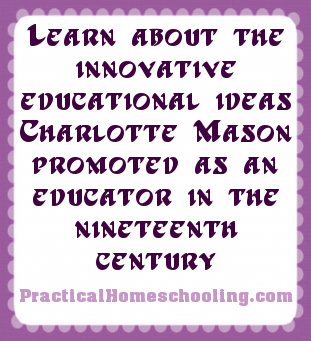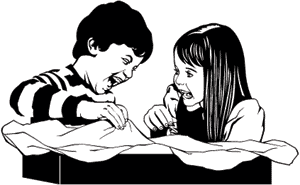 Years ago I was reading Susan Macaulay's For The Children's Sake and forming a philosophy of
education. Mrs. Macaulay repeatedly mentioned the work of a 19th-century British educator named
Charlotte Mason. Miss Mason had been instrumental in founding a chain of parent-controlled schools,
called the Parent's National Education Union (PNEU). She also had influenced many families into
employing her early education and child-training methods in their own home.
Years ago I was reading Susan Macaulay's For The Children's Sake and forming a philosophy of
education. Mrs. Macaulay repeatedly mentioned the work of a 19th-century British educator named
Charlotte Mason. Miss Mason had been instrumental in founding a chain of parent-controlled schools,
called the Parent's National Education Union (PNEU). She also had influenced many families into
employing her early education and child-training methods in their own home.
Living Books
One of the first things that impressed me about Charlotte was her method of using whole books
and first-hand sources.
My first two children were young then, and we were already in the habit of walking to the local
library, with our youngest in the stroller. (We lived in England at the time, where walking is a
normal everyday activity.) Along with illustrated story books, I also read aloud from nonfiction
picture books. Therefore it wasn't difficult to carry this concept over when homeschooling in the
early elementary years - those years when "whole" books normally begin to disappear to make room for
authoritative textbooks.
Textbooks compiled by a committee tend to be crammed with facts and information, at the expense
of human emotion. This dryness is deadening to the imagination of the child. Miss Mason advocated
what she called "living books." Whole books are living in a sense that they are written by a single
author who shares his favorite subject with us and we pick up his enthusiasm. Textbooks written by
one author might make this claim, too.
Charlotte Mason noted that very few real books were ever put into the hands of children in
school. This, she thought, was a shame since England is so known for its literary genius. Although
she lived and worked for educational reform in England in the latter part of the last century her
work is undergoing a revival in homeschool circles as parents today are using whole books whenever
possible, rather than textbooks alone.
Narration
With living books a child gains knowledge through his own work, digging out facts and
information. He then expresses what he has learned by clothing it in literary (conversational)
language - in short, narrating it back to you.
Miss Mason believed that narration is the best way to acquire knowledge from books. Narration
also provides opportunities for a child to form an opinion or make a judgment, no matter how crude.
Because narration takes the place of questionnaires and multiple-choice tests, it enables the child
to bring all the faculties of his mind into play. The child learns to call on the vocabulary and
descriptive power of good writers as he tells his own version of the passage or chapter.
No Homework
Another attraction to Miss Mason's philosophy is that her schools never gave homework to
students under the age of 13. When a child follows her method, there is no need for homework in the
elementary years, because the child immediately deals with the literature at hand and proves his
mastery by narrating at the time of the reading.
Studies have proved homework to be less effective than this form of immediate feedback.
Instead of homework, my children enjoy an atmosphere of a cozy evening with a good book and
parental attention.
No Grades - Short Lessons - Motivation of Lasting Value
Miss Mason was an idealist. Unlike some idealistic persons she worked out her scheme and saw it
put into practice. She wanted children to be motivated by admiration, faith, and love instead of
artificial stimulants such as prizes (stickers, candy, or money), competition, and grades.
Miss Mason managed to retain a child's curiosity and develop a love of knowledge in a child that
he would carry on all through his life. The children took examinations where they narrated orally or
on paper from "those lovely" books that they read that semester. Each child learned first to acquire
the habit of attention by listening to and narrating short stories, and by accomplishing short
lessons in the drills and skills. Short lessons discourage dawdling; they encourage the child to
concentrate and make his best effort. Because the Charlotte Mason method employs whole books,
narration, and short lessons, a child taught this way will try his best even though he will not be
graded.
My own children have grown to love reading. "Ma, guess what?" can be heard often in our house as
my daughter enters a room to tell about something new she has read silently on her own. Years after
we began using this method, my older children are disciplined enough to do much longer lessons in
things that they do not "take to" naturally such as math and grammar. I owe this success to
Charlotte Mason, who has taught me to have higher ideals.
Free Afternoons
Bookish lessons in the Charlotte Mason scheme of things end at 1:00 p.m., or earlier if the
children are quite young. High-school students will probably need some afternoon study time, but
overall the afternoon is free for leisure. This is another aspect of her philosophy that so easily
finds its way into the modern homeschool.
Leisure for children usually means running, climbing, yelling, and so forth - all out of doors.
It has been observed that boys, particularly, cannot flourish without this opportunity. Handicrafts,
practicing an instrument, chores, cooking, visiting lonely neighbors, observing and recording the
wonders of nature may also be accomplished during this time.
Sadly, public-school children (young or old) must endure such long lessons and long hours that
they are frequently tranquilized with drugs in order to pass through the system. They ride the bus
home just in time to see the sun set and do homework.
Few Lectures
I was also drawn to Miss Mason's philosophy because it doesn't require me to give lectures.
Charlotte pointed out that I need not be a certified teacher trained in the skill of giving lectures
in order for my children to learn. This was a relief to me.
 Through Charlotte's method, children gain the ability of educating themselves. Students do not
depend upon notes they have taken from a teacher's lecture where most of the information has been
predigested by the teacher. With Charlotte's superior method of narration from books, the carefully
chosen words of an author are commented on by the child in essay form, either oral or written,
starting at age 6 or 7. Too much explaining by the teacher can be a bore because, in actuality, the
only true education is that of self-education.
Through Charlotte's method, children gain the ability of educating themselves. Students do not
depend upon notes they have taken from a teacher's lecture where most of the information has been
predigested by the teacher. With Charlotte's superior method of narration from books, the carefully
chosen words of an author are commented on by the child in essay form, either oral or written,
starting at age 6 or 7. Too much explaining by the teacher can be a bore because, in actuality, the
only true education is that of self-education.
Ideas and Culture
Inspiring children to love knowledge depends on how well ideas are presented to them. The mind
feeds upon ideas. To quote Miss Mason, "Ideas must reach us directly from the mind of the thinker,
and it is chiefly by the means of the books they have written that we get in touch with the best
minds." This includes all forms of human expression. This is why Charlotte said the Bible and
"varied human reading as well as the appreciation of the humanities (culture) is not a luxury, a
tidbit, to be given to children now and then, but their very bread of life."
Charlotte's curriculum enabled children of all classes to experience books and culture in
abundance when in Victorian days the arts and humanities seemed to belong only to the "well-to-do"
classes.
Today, with so many pictures and art print books available, children can observe museum pieces
and learn to recognize the works of dozens of artists over time just by changing what goes under the
thumb tack once every two weeks or so. Our children can easily become familiar with the music of
great composers by listening to cassettes and CDs, when years ago they would have needed to visit a
concert hall.
During a visit to a large church, we entered the pew while a prelude was playing. One of my
young children proclaimed excitedly, "Mommy, that's Bach!" Succumbing to the kind of pride a mother
can easily fall prey to I whispered, "Say it a little louder, honey," instead of my usual motion to
quiet her.
It is surprising what influence a little inexpensive cassette can have when a great mind is
recorded on it!
Education is a Discipline
One of the challenges of homeschooling is that it is simply a new thing to think about and to
do. I wanted to teach and train my children, but because I was taught and trained by institutions,
teaching this new way felt rather awkward at first. Feelings of insecurity and inadequacy make a
distraught mother.
Happily, Charlotte's definition of education includes a definite dose of discipline. This helps
anxious mother get everything under control.
What Charlotte meant by "discipline," in Victorian-day terms, is that proper education
inculcates good habits. The mother who takes pains to endow her children with good habits secures
for herself smooth and orderly days. On the other hand, she who lets habits take care of themselves
has a weary life of endless friction.
The mother needs to acquire her own habit of training her children so that, by and by, it is not
troublesome to her, but a pleasure, She devotes herself to the formation of one habit in her
children at a time, doing no more than watch over those already formed. Remember, to instill
habits:
- Be consistent. The danger is when we let things go "just this once."
- Forming a habit is using perseverance to work against a contrary habit.
- Formation is easier than reformation. Nip each weed in the bud!
Sane Education
If the above ideas sound as sane and sensible to you as they have to me, perhaps it is because Charlotte Mason hasn't been the only one sharing these "open secrets." Other voices in homeschooling are now sharing conclusions similar to those that Charlotte Mason advocated so many years ago. Many of us have come to similar conclusions about what goes into a well-brought-up person - "great minds think alike." Happily, many children are benefiting from a Charlotte Mason-style education in homeschools across the nation.
Resources
Charlotte Mason Books and materials still in print include:
- The Original Homeschool Series (in six volumes)
- Simply Grammar
- Parents' Review (A 40-page quarterly for home training and culture)
For a further explanation of the educational philosophy mentioned in this article, write Charlotte Mason Research & Supply Co.